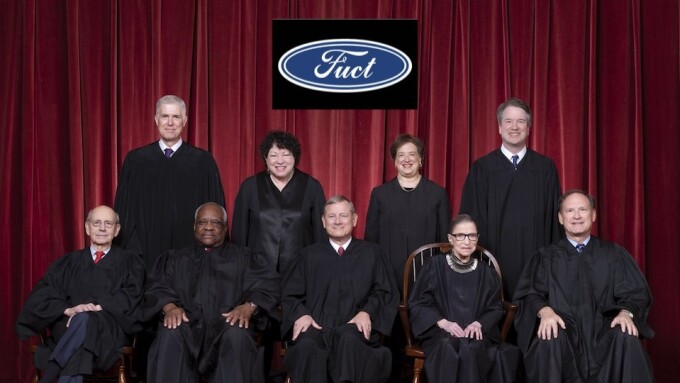WASHINGTON, D.C. — The Supreme Court struck down today a federal law provision banning the registration of "immoral" or "scandalous" trademarks, calling it an infringement of the First Amendment, but Judge Alito called for Congress to legislate more explicitly against what he considers "vulgar" terms.
“The justices' ruling clears the way for a clothing designer to apply for a federal trademark for his clothing line called FUCT,” CNN reported.
Justice Elena Kagan wrote the majority opinion. The ruling was unanimous in part and 6-3 in part. Kagan was joined by Justices Clarence Thomas, Ruth Bader Ginsburg, Samuel Alito, Brett Kavanaugh, and Neil Gorsuch in full, while Chief Justice John Roberts and Justices Stephen Breyer and Sonia Sotomayor dissented in part.
"We hold that this provision infringes the First Amendment," Kagan wrote, because it "disfavors certain ideas."
The ruling, according to CNN, “could open the doors to more requests to register words or phrases that have been considered vulgar, a concern that the court's minority feared.”
Justice Alito, however, suggested Congress should legislate to more explicitly prevent people from trademarking “vulgar terms,” which he apparently thinks do not play real part in ideological debates.
For the Conservative Justice, nominated by George W. Bush in 2006, Congress should define “vulgar terms” as words that “further coarsen our popular culture.”
FUCT owner, Erik Brunetti, named his brand in 1990 allegedly “to question authority.” Brunetti claims the made-up word, homophone for “fucked,” is actually an acronym for “FRIENDS U CAN'T TRUST."
Brunetti attempted to register his trademark in 2011, but the United States Patent and Trademark Office refused him.
The Patent Office, according to the CNN report, told Brunnetti that FUCT was “the ‘phonetic equivalent’ of the past tense of a vulgar word, and determined that federal law prohibits the registration of trademarks that consist of ‘scandalous’ subject matter.”
"This decision represents a significant victory for First Amendment rights, and will provide broad opportunity for adult businesses that use explicit brand names," Lawrence G. Walters, First Amendment attorney and owner of Walters Law Group told XBIZ. "Some of our clients have been waiting for this decision for many years. The idea that the USPTO could deny trademark registration based on a moral viewpoint has always conflicted with free speech rights. This case finally puts any doubt about that issue to rest."
"The opinion itself," Walters continued "is important for First Amendment jurisprudence going forward, particularly in viewpoint discrimination cases. As Justice Alito said, 'viewpoint discrimination is poison to a free society.' The Court made clear that the First Amendment will not tolerate government censorship based on viewpoint."
The Supreme Court Justices were more concerned with the wording of the federal law, which could be interpreted as preventing “the expression of ideas.”
Kagan’s opinion stressed that the law "does not draw the line at lewd, sexually explicit, or profane marks,” but could be applied to "the universe of immoral or scandalous" material. "A law disfavoring 'ideas that offend' discriminates based on viewpoint, in violation of the First Amendment," wrote Kagan.
According to CNN, the partial dissent, by Chief Justice Roberts and Justices Breyer and Sotomayor, “would have saved part of the statute that prohibits ‘scandalous’ trademarks. Breyer said he would do so because "these attention-grabbing words" may lead "to the creation of public spaces that many will find repellant, perhaps on occasion creating the risk of verbal altercations or even physical confrontations."
"Just think about how you might react if you saw someone wearing a t-shirt or using a product emblazoned with an odious racial epithet,” Breyer wrote.







